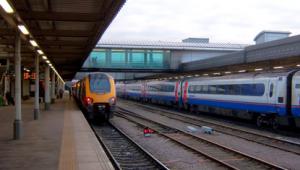More than £150m could be saved annually if the firm that owns Britain’s railways was brought into full public ownership, according to a report published today.
In Rebuilding rail, the Transport for Quality of Life think-tank said the independent but state-backed Network Rail should be formally turned into a government-owned organisation to run the national network.The report, commissioned by four transport trade unions, concluded that £150m of debt interest payments could be saved every year by allowing the infrastructure operator to borrow at the cheaper rate of government gilts.
The not-for-dividend firm would also be made ‘properly accountable to government for the public money that it spends’.
Network Rail was formed in October 2002 after the collapse of the private sector firm Railtrack that had taken over the operation of the network at privatisation in 1994. It is government owned, but is accountable to members from across the industry, such as passenger franchise owners and freight train operators.
The consultancy’s final report also reiterated conclusions it made last year, as part of its interim recommendations, to take the operation of the train services back into public ownership.
It concluded that the fragmented rail system created by privatisation – with separate track, operating and rolling stock companies – was ‘failing society, the economy and the environment’ as well as costing taxpayers’ money.
Report authors Ian Taylor and Lynn Sloman said that the Rail Value for Money Study, undertaken for the government by Sir Roy McNulty, had confirmed the ‘excessive costs’ in the industry.
McNulty’s report to government, published last May, estimated that savings of between £700m and £1bn could be made annually by 2019 by reducing the ‘fragmentation of structures and interfaces’ in the industry. It also called for the correction of ‘ineffective and misaligned incentives’.
Taylor and Slomanconcluded this could be done by simplifying the operation under a public sector company called GB Rail, which would run passenger train franchises. Taking over train routes as they expire would ‘not require significant public expenditure’, as operators could be absorbed into GB Rail’s ‘public passenger operations’ when their contracts end.
The report stated: ‘Bringing passenger operations back into the public sector in a gradual way would provide a comparator against which the performance of other operators could be benchmarked. Our proposed gradual approach offers a means to build a consensus over time, through measurement and comparison of the performance of private and public operations.’
The report also called for GB Rail to act as the ‘guiding mind’ of an integrated railway. While European Union law poses constraints on how integration can be achieved, the report said the UK could copy arrangements in other European countries. These, such as Germany and Italy, show that substantial integration is possible.
GB Rail would be a publicly owned corporation. There would be one subsidiary company responsible for passenger train operations and certain functions relating to infrastructure, and a separate subsidiary company responsible for timetabling, capacity allocation and access charges. This split ‘appears compliant with EU law’, the report concluded.





















